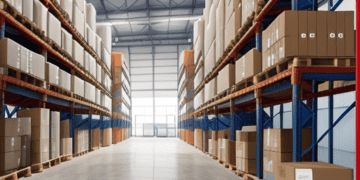In the landscape of global trade affected by pandemic-related disruptions, warehouses worldwide are challenged to elevate their performance to meet heightened demands and ensure smoother import and export operations.
Within the current environment of supply chain disruptions, focusing on fundamental strategies becomes pivotal to enhancing import and export performance. Here are eight neutral and informative tactics aimed at streamlining import and export operations:
- Assess the suitability of EDI or API for your business: Efficient warehouse performance relies on seamless information exchange, such as bills of lading, among business partners. Evaluate whether Electronic Data Interchange (EDI) or Application Programming Interface (API) aligns better with your operational needs. While EDI has been a long-standing element in international supply chains, API-based systems are gaining popularity due to their flexibility and cloud-based real-time collaboration capabilities.
- Evaluate the need for a dedicated import/export facility: Some businesses might benefit from segregating import or export operations into dedicated facilities to alleviate delays experienced in domestic operations due to international activities. This could involve establishing a separate facility within the same campus or outsourcing these operations to a third-party logistics provider with specialized infrastructure.
- Consider adopting RFID technology: Radio Frequency Identification (RFID) presents a viable alternative to traditional barcodes, offering advantages like simultaneous tag scanning and storing complex information. For businesses focusing on smooth importing and exporting, RFID’s ability to ensure transparency by documenting each stage of the cargo journey could be beneficial.
- Implement cloud workflows for global collaboration: In today’s global economy, real-time communication through cloud-based workflows has become imperative. Leveraging logistics Software-as-a-Service (SaaS) deployments facilitates seamless collaboration with international partners, reducing miscommunications and enhancing transparency in critical supply chain processes.
- Collaborate with a reliable 3PL: Partnering with a dependable third-party logistics provider experienced in international logistics can significantly impact the efficiency and compliance of your import/export operations, ensuring smoother logistics and operational productivity.
- Ensure understanding of compliance responsibilities among workers: Compliance remains a complex aspect of importing and exporting. Providing adequate training to workers to comprehend and address compliance misalignments before they occur can significantly enhance warehouse and logistics efficiency.
- Streamline picking and packing processes: Improving picking and packing processes is crucial to optimizing warehouse performance in international trade. Warehouse-specific methods such as re-evaluating slotting systems or implementing automated systems can alleviate bottlenecks and enhance efficiency.
- Utilize a Warehouse Management System (WMS): A WMS is essential for modern warehouses, especially those handling imports and exports. Look for cloud-based systems offering automation for compliance and simplification of information flows to harmonize international workflows efficiently.
In summary, these strategies aim to optimize warehouse operations, addressing challenges and enhancing efficiency in the context of international trade disruptions.
Get the newest updates in supply chain logistics news on The Supply Chain Report. Visit ADAMftd.com for free international trade tools.
#GlobalTrade #WarehouseOptimization #SupplyChainEfficiency #RFIDTechnology #CloudCollaboration #3PLPartnership #ImportExportStrategies #WMS #EDIvsAPI #LogisticsInnovation #ComplianceTraining #WarehouseAutomation #SupplyChainDisruptions #LogisticsTechnology #TradeSolutions
















